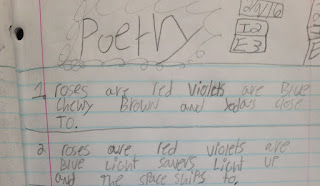I have been a bit behind in my blogging this month, but am getting back into the writing swing of things with a link up to DigiLit Sunday. Margaret Simon posted here about using a Writing Notebook to share our lives, and it reminded me to write a post about our Jedi Writing experiment with +Lori Horne's 4th graders this year!
Our school has been doing Writing Workshop for 3 years now, and we are working out the flaws a little more each year. Workshop has helped us focus on genre of writing (namely expository, narrative, and opinion) but I have also seen a slide in kids just writing what matters to them no matter the genre. I'm not talking about having a daily prompt, but just an independent application of what we have taught them in Workshop on their own timeline with their own ideas. I had just seen Ralph Fletcher at a conference, and the idea of informal writing was just swimming in my head. I had talked to him after his presentation, and his interest in the topic struck a chord with me.
I talked with Lori Horne and we started our "training." Mrs. Horne's students know more about Star Wars than I thought humanly possible. Jedi Writing Training was born. First thing we did was made an anchor chart of all the types of writing they had learned so far this year. We put small moments, narrative fiction, essays, and informational writing up first. I then did a mini-lesson on how to make a list, and added that to the chart. We handed them each a notebook, and said, "Go off and write any genre on that list about a topic you choose. It just has to matter to YOU."
I came in every day after lunch for about 30 minutes at first, giving them a little mini lesson with either a new type of writing, or a mentor text to pull craft moves out of. Every day, though, the choice was up to them to use those lessons, or to write from any genre on our growing list of writing styles about anything that mattered to them. They wrote in their notebooks for about 10 minutes, and then they assessed themselves for Ideas and Effort. They simply took a minute and wrote a capital I and E with a number at the top of their writing, while I walked around and snapped 2 pictures of writing to share. We would then display it on the Apple TV, identify the genre they chose to write, and give them feedback. If they wrote in a genre that wasn't on our chart, we added it.
Can I just say that this became my favorite part of the day?
From a teacher's standpoint, I was really impressed that the kids started to notice the different genres, and started to use them purposely. Some kids chose to use the same genres to write over and over again, but some had a variety of writing in their notebooks. They also started to pick up craft moves from books we shared, and from EACH OTHER. By sharing student samples everyday and giving feedback, I started to see the kids using each other's writing as inspiration.
From a human standpoint, I started to learn more about what matters to the kids as people. Through their writing, it was clear that some kids struggle with things in life, whether at home or in school. I started to see the things that interest them, and it connected me to them better as a teacher. One thing about humans in general is wanting to feel success. I saw real pride and success in their eyes when sharing with their classmates. There were many days when I had to leave to go to my next class and kids were following me out to read their writing to me. I have spent my whole career asking kids to read their own writing back to themselves, and here they were following me out the door to read it. We ended up creating a KidBlog page to allow them to have a wider audience in the class.
Was it the power of the Jedi? There is something about creating a shared theme that is relevant to them. But, the truth is, despite a few random mini lessons and some fun Star Wars t-shirt days arranged by Mrs. Horne, they didn't actually write about Star Wars. Well, perhaps a few did. I mean, we did tell them to write about what matters to them. And, they did.
fictional stories
poems of different varieties
stories inspired by authors
comic strips
personal narratives
scientific musings
lists
hybrid texts

















That last one was written about a black and white photo of a family taken in 1906. It was my own ancestors from Ireland, so Spy Family was a personal favorite of mine.
Another favorite thing to do was to read their blogs. Once I wasn't able to go in to their class every day, their blogs gave me a constant window into their writing lives. Most of their posts on the blogs were geared towards a classmate audience, but then you'd find poems like this. Inspired.
We gave them 10 minutes a day to practice writing in various genres about things that matter to them. We didn't correct their spelling, or tell them that they had to choose something other than Batman to write about. We let them have 10 minutes. Sure, there were spelling mistakes and unfinished stories. Punctuation was missing for sure. We have other times in our day to fix those things. But, the FORCE was with them for those 10 minutes. They considered themselves writers.










































